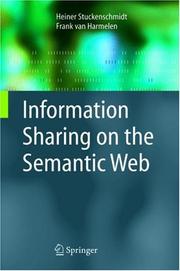| Listing 1 - 4 of 4 |
Sort by
|

ISBN: 3540205942 364205823X 9786610312405 1280312408 354026907X Year: 2005 Publisher: Berlin ; New York : Springer,
Abstract | Keywords | Export | Availability | Bookmark
 Loading...
Loading...Choose an application
- Reference Manager
- EndNote
- RefWorks (Direct export to RefWorks)
The large-scale and almost ubiquitous availability of information has become as much of a curse as it is a blessing. The more information is available, the harder it is to locate any particular piece of it. And even when it has been successfully found, it is even harder still to usefully combine it with other information we may already possess. It is commonly understood that this problem of information sharing can only be solved by giving computers better access to the semantics of the information. While it has been recognized that ontologies play a crucial role in solving the open problems, most approaches rely on the existence of well-established data structures. To overcome these shortcomings, Stuckenschmidt and van Harmelen describe ontology-based approaches for resolving semantic heterogeneity in weakly structured environments, in particular the World Wide Web. Addressing problems like missing conceptual models, unclear system boundaries, and heterogeneous representations, they design a framework for ontology-based information sharing in weakly structured environments like the Semantic Web. For researchers and students in areas related to the Semantic Web, the authors provide not only a comprehensive overview of the State of the art, but also present in detail recent research in areas like ontology design for information integration, metadata generation and management, and representation and management of distributed ontologies. For professionals in areas such as e-commerce and knowledge management, the book provides decision support on the use of novel technologies, information about potential problems, and guidelines for the successful application of existing technologies.
Semantic web --- Ontologies (Information retrieval) --- Knowledge management --- Semantic integration (Computer systems) --- Information retrieval --- Information organization --- Knowledge management. --- Semantic Web. --- Ontologies (Information retrieval). --- Semantic integration (Computer systems). --- Organization of information --- Integration, Semantic (Computer systems) --- Computer science. --- Database management. --- Information storage and retrieval. --- Artificial intelligence. --- Computer Science. --- Information Storage and Retrieval. --- Popular Computer Science. --- Computer Science, general. --- Database Management. --- Information Systems Applications (incl. Internet). --- Artificial Intelligence (incl. Robotics). --- AI (Artificial intelligence) --- Artificial thinking --- Electronic brains --- Intellectronics --- Intelligence, Artificial --- Intelligent machines --- Machine intelligence --- Thinking, Artificial --- Bionics --- Cognitive science --- Digital computer simulation --- Electronic data processing --- Logic machines --- Machine theory --- Self-organizing systems --- Simulation methods --- Fifth generation computers --- Neural computers --- Data base management --- Data services (Database management) --- Database management services --- DBMS (Computer science) --- Generalized data management systems --- Services, Database management --- Systems, Database management --- Systems, Generalized database management --- Informatics --- Science --- Information retrieval. --- Information organization. --- Information storage and retrieval --- Information science --- Information storage and retrieval systems --- Data retrieval --- Data storage --- Discovery, Information --- Information discovery --- Retrieval of information --- Documentation --- Integrated software --- Semantic computing --- Semantic networks (Information theory) --- World Wide Web --- Microformats --- Semantic Web --- Recherche de l'information --- Organisation de l'information --- Web sémantique --- EPUB-LIV-FT LIVINFOR SPRINGER-B --- Information storage and retrieva. --- Artificial Intelligence. --- Information storage and retrieval systems. --- Automatic data storage --- Automatic information retrieval --- Automation in documentation --- Computer-based information systems --- Data processing systems --- Data storage and retrieval systems --- Discovery systems, Information --- Information discovery systems --- Information processing systems --- Information retrieval systems --- Machine data storage and retrieval --- Mechanized information storage and retrieval systems --- Computer systems --- Electronic information resources --- Data libraries --- Digital libraries --- Application software. --- Application computer programs --- Application computer software --- Applications software --- Apps (Computer software) --- Computer software
Book
ISBN: 3319557351 3319557343 Year: 2017 Publisher: Springer Nature
Abstract | Keywords | Export | Availability | Bookmark
 Loading...
Loading...Choose an application
- Reference Manager
- EndNote
- RefWorks (Direct export to RefWorks)
This book is open access under a CC BY-NC 4.0 license. This volume discusses the prospects and evolution of informatics (or computer science), which has become the operating system of our world, and is today seen as the science of the information society. Its artifacts change the world and its methods have an impact on how we think about and perceive the world. Classical computer science is built on the notion of an “abstract” machine, which can be instantiated by software to any concrete problem-solving machine, changing its behavior in response to external and internal states, allowing for self-reflective and “intelligent” behavior. However, current phenomena such as the Web, cyber physical systems or the Internet of Things show us that we might already have gone beyond this idea, exemplifying a metamorphosis from a stand-alone calculator to the global operating system of our society. Thus computer scientists will need to reconsider the foundations of their discipline to realize the full potential of our field. Taking often contradictory developments into consideration, researchers will not be able to tackle specific technological or methodological problems in the future without also a broader reflection on their field. The papers in this book take a first step forward and reflect on these issues from different perspectives. The broad spectrum of topics includes Informatics: a discipline with a (short) history and a high impact Interdisciplinarity: how to do research Ethics: what is our responsibility Diversity: why are there so few women in informatics Combining informatics, history and art: a special contribution. This book is intended for all informatics researchers, in academia as well as in industry. It is our responsibility – not only as scientists but also as citizens – to make the public aware of the dichotomies and dialectic relationships of computer science.
Computer science. --- Research --- Computers. --- Computers and civilization. --- Computer Science. --- Computers and Society. --- History of Computing. --- Diversity Management/Women in Business. --- Research Ethics. --- Moral and ethical aspects. --- Civilization and computers --- Civilization --- Automatic computers --- Automatic data processors --- Computer hardware --- Computing machines (Computers) --- Electronic brains --- Electronic calculating-machines --- Electronic computers --- Hardware, Computer --- Computer systems --- Cybernetics --- Machine theory --- Calculators --- Cyberspace --- Research ethics --- Informatics --- Science --- Diversity in the workplace. --- Research-Moral and ethical aspec. --- Cultural diversity in the workplace --- Cultural diversity in workforce --- Diversity in the workforce --- Diversity in the work place --- Multicultural diversity in the workplace --- Multicultural workforce --- Workforce diversity --- Multiculturalism --- Personnel management --- Research—Moral and ethical aspects. --- Women in computing --- Big data --- Computing ethics

ISBN: 9780444522115 0444522115 9780080557021 0080557023 1281144940 9786611144944 Year: 2008 Publisher: Amsterdam Boston Elsevier
Abstract | Keywords | Export | Availability | Bookmark
 Loading...
Loading...Choose an application
- Reference Manager
- EndNote
- RefWorks (Direct export to RefWorks)
Knowledge Representation, which lies at the core of Artificial Intelligence, is concerned with encoding knowledge on computers to enable systems to reason automatically. The Handbook of Knowledge Representation is an up-to-date review of twenty-five key topics in knowledge representation, written by the leaders of each field.This book is an essential resource for students, researchers and practitioners in all areas of Artificial Intelligence.* Make your computer smarter* Handle qualitative and uncertain information* Improve computational tractability to solve yo
Book
ISBN: 3642397832 3642397840 Year: 2013 Publisher: Berlin, Heidelberg : Springer Berlin Heidelberg : Imprint: Springer,
Abstract | Keywords | Export | Availability | Bookmark
 Loading...
Loading...Choose an application
- Reference Manager
- EndNote
- RefWorks (Direct export to RefWorks)
This volume contains the lecture notes of the 9th Reasoning Web Summer School 2013, held in Mannheim, Germany, in July/August 2013. The 2013 summer school program covered diverse aspects of Web reasoning, ranging from scalable lightweight formalisms such as RDF to more expressive ontology languages based on description logics. It also featured foundational reasoning techniques used in answer set programming and ontology-based data access as well as emerging topics like geo-spatial information handling and reasoning-driven information extraction and integration.
Semantic Web --- Semantic computing --- Engineering & Applied Sciences --- Mechanical Engineering --- Computer Science --- Mechanical Engineering - General --- Information Technology --- Artificial Intelligence --- Computer science. --- Mathematical logic. --- Database management. --- Artificial intelligence. --- Computer Science. --- Artificial Intelligence (incl. Robotics). --- Database Management. --- Mathematical Logic and Formal Languages. --- Computer science --- Electronic data processing --- Semantics --- Artificial Intelligence. --- Data base management --- Data services (Database management) --- Database management services --- DBMS (Computer science) --- Generalized data management systems --- Services, Database management --- Systems, Database management --- Systems, Generalized database management --- Informatics --- Science --- AI (Artificial intelligence) --- Artificial thinking --- Electronic brains --- Intellectronics --- Intelligence, Artificial --- Intelligent machines --- Machine intelligence --- Thinking, Artificial --- Bionics --- Cognitive science --- Digital computer simulation --- Logic machines --- Machine theory --- Self-organizing systems --- Simulation methods --- Fifth generation computers --- Neural computers --- Algebra of logic --- Logic, Universal --- Mathematical logic --- Symbolic and mathematical logic --- Symbolic logic --- Mathematics --- Algebra, Abstract --- Metamathematics --- Set theory --- Syllogism --- Reasoning web
| Listing 1 - 4 of 4 |
Sort by
|

 Search
Search Feedback
Feedback About UniCat
About UniCat  Help
Help News
News